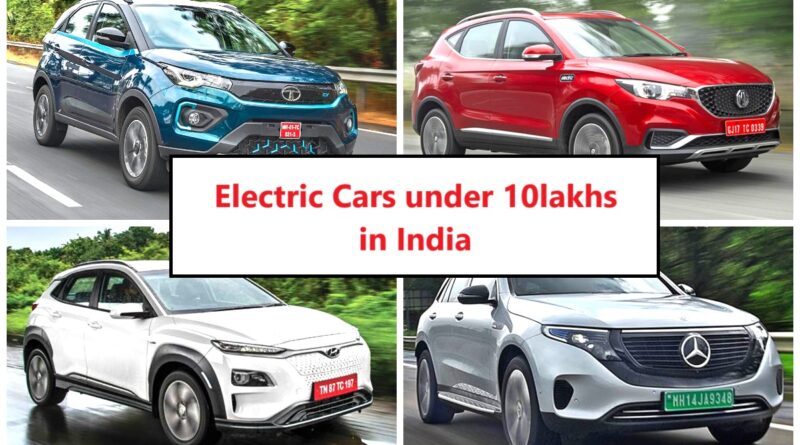Electric Cars in India Under ₹10 Lakhs: Features, Mileage, and Benefits
The electric vehicle (EV) revolution is gaining momentum worldwide, and India is no exception. With increasing environmental awareness, government incentives, and rising fuel prices, more Indian consumers are looking for affordable electric cars. The Indian EV market is expanding rapidly, and car manufacturers are offering budget-friendly electric cars with impressive features, performance, and mileage.
In this article, we will explore electric cars available in India for under ₹10 lakhs, focusing on their features, mileage, and how they make eco-friendly driving accessible to the masses.
Why Choose Electric Cars?
Before diving into the list of electric cars, it’s important to understand the advantages of owning an electric vehicle in India.
Environmental Benefits: Electric cars produce zero tailpipe emissions, reducing air pollution and helping mitigate climate change.
Cost Efficiency: The cost per kilometer of driving an electric car is significantly lower than a petrol or diesel vehicle. Charging an EV is cheaper than refueling traditional cars, and maintenance costs are lower since EVs have fewer moving parts.
Government Incentives: The Indian government offers subsidies and tax benefits to promote electric vehicle adoption. Under the FAME II (Faster Adoption and Manufacturing of Electric Vehicles) scheme, EV buyers can avail of various incentives, further reducing the cost of ownership.
Silent and Smooth Driving: Electric cars operate quietly, providing a smooth and noise-free driving experience, which adds to overall comfort.
With these benefits in mind, let’s take a closer look at the best electric cars in India under ₹10 lakhs.
1. Tata Tiago EV
The Tata Tiago EV is one of the most affordable and feature-rich electric cars available in India. Tata Motors has been a pioneer in the Indian EV market, and the Tiago EV is part of their push to make electric vehicles accessible to the general public.
Price: Starts at ₹8.69 lakhs (ex-showroom)
Battery and Range:
19.2 kWh and 24 kWh battery options
Range of up to 250 km (for 19.2 kWh) and 315 km (for 24 kWh) on a single charge
Charging:
Fast charging: Charges up to 80% in 57 minutes
Standard charging: Full charge in 6.9 hours (19.2 kWh) or 8.7 hours (24 kWh)
Key Features:
Automatic climate control
7-inch touchscreen infotainment system
Regenerative braking to extend range
ABS with EBD
Dual airbags for safety
Connected car technology
Mileage: Approx. 9-10 paise per km, depending on electricity rates.
The Tata Tiago EV is an excellent choice for city commuters, offering a good balance between price, range, and features. The compact size makes it ideal for navigating through urban traffic, and its range is more than sufficient for daily use.
Top 3 Electric Cars in India 2024: Range, Charging & Features
2. MG Comet EV
The MG Comet EV is a new entrant to the Indian market, known for its compact design, stylish looks, and affordability. Designed for city driving, it packs impressive features for its price range.
Price: Starts at ₹7.98 lakhs (ex-showroom)
Battery and Range:
17.3 kWh battery pack
Range of approximately 230 km on a full charge
Charging:
Charges up to 80% in 5 hours with a standard home charger
Full charge in 7 hours with a 3.3 kW AC charger
Key Features:
Digital instrument cluster
Touchscreen infotainment system
Voice command functions
Keyless entry
Dual airbags
ABS with EBD
Mileage: Around 7-8 paise per km, depending on usage and charging costs.
The MG Comet EV is perfect for those seeking a compact, efficient, and affordable electric vehicle for city commuting. Its unique design and tech features make it stand out among other budget EVs in India.
3. Citroen eC3
The Citroën ëC3 is the electric version of the popular C3 model. Known for its spacious interiors and quirky design, the ëC3 offers a good mix of comfort and performance in the sub-₹10 lakh segment.
Price: Starts at ₹9.99 lakhs (ex-showroom)
Battery and Range:
29.2 kWh battery
Range of around 320 km on a single charge
Charging:
Fast charging: Charges up to 80% in 57 minutes
Home charging: Full charge in about 10.5 hours
Top 10 Best 5G Mobiles Under ₹20,000 in India
Key Features:
10-inch touchscreen infotainment system
Wireless Apple CarPlay and Android Auto
ABS with EBD
Dual airbags
Manual air conditioning
Height-adjustable driver seat
Mileage: Approx. 9-11 paise per km, depending on charging conditions.
The Citroën ëC3 is an ideal option for families looking for an electric car that provides space, comfort, and a respectable driving range. Its stylish design and range make it a strong competitor in this price bracket.
4. Mahindra eKUV100
The Mahindra eKUV100 is one of the most anticipated electric SUVs in the Indian market. Known for its robust build and compact SUV design, this EV offers a great combination of affordability and utility.
Price: Expected to start around ₹9 lakhs (ex-showroom)
Battery and Range:
15.9 kWh battery pack
Range of 147 km on a full charge
Charging:
Fast charging: 80% charge in 1 hour
Regular charging: Full charge in 5-6 hours with a standard charger
Key Features:
Infotainment system with touchscreen
Automatic climate control
Electric power steering
Dual airbags
ABS with EBD
Regenerative braking
Mileage: Around 6-7 paise per km, based on energy consumption.
Though the Mahindra eKUV100 has a relatively smaller range compared to other EVs in this list, it’s perfect for short city commutes. Its compact SUV design offers good ground clearance and the convenience of an urban runabout.
5. PMV EaS-E
The PMV EaS-E is a unique, ultra-affordable electric microcar designed for urban environments. Targeted at city dwellers, it’s a two-seater vehicle that offers impressive features at a budget-friendly price.
Price: Starts at ₹4.79 lakhs (ex-showroom)
Battery and Range:
48V lithium-iron-phosphate battery
Range of 160 km on a full charge
Charging:
Full charge in under 4 hours with a standard household charger
Key Features:
Compact, lightweight design
Touchscreen infotainment
Air conditioning
Dual airbags
Remote control via mobile app
Mileage: Approx. 3-4 paise per km, making it one of the most economical EVs in terms of running costs.
The PMV EaS-E is ideal for eco-conscious individuals who need a small, affordable vehicle for daily commuting. It’s easy to park and maneuver, making it perfect for congested city roads.
Conclusion: The Future of Affordable Electric Cars in India
As the Indian electric vehicle market continues to grow, affordable EVs under ₹10 lakhs are becoming more accessible to the average consumer. The vehicles listed above offer a balance of features, range, and price, making them viable options for city dwellers and daily commuters.
When choosing an electric car, it’s important to consider your driving habits, charging infrastructure, and budget. With government incentives, the cost of owning an electric car can be reduced even further, making it an excellent choice for both the environment and your wallet.
Government Initiatives Supporting EV Adoption
To encourage the adoption of electric vehicles, the Indian government has introduced several initiatives under the FAME II scheme. These include subsidies for purchasing EVs, tax reductions, and discounts on charging infrastructure setup. In addition, state governments offer their own incentives, such as road tax exemptions and subsidies on electric vehicle purchases.
These initiatives not only reduce the overall cost of owning an electric vehicle but also help make EVs more accessible to a larger audience, accelerating the shift towards a greener future.
The Future of EVs in India
With advancements in battery technology, more affordable and higher-range electric cars are expected to hit the Indian market in the coming years. Charging infrastructure is also rapidly expanding, with more public charging stations being installed across cities and highways, making EVs more practical for long-distance travel.
As technology improves and prices come down, we can expect to see an even wider range of electric cars catering to different consumer needs. The future of mobility in India is undoubtedly electric, and the cars mentioned here are a glimpse of what lies ahead in terms of affordability and innovation.




